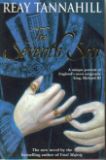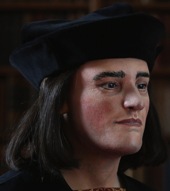The Seventh Son
 Reay Tannahill, The Seventh Son. Headline, London, 2001. ISBN 0 7472 7043 0 (trade paperback)
Reay Tannahill, The Seventh Son. Headline, London, 2001. ISBN 0 7472 7043 0 (trade paperback)
Reay Tannahill has written several historical novels including Fatal Majesty and A Dark and Distant Shore, as well as the highly successful “fact” based Food in History and Sex in History. This is appropriately her seventh work and the Seventh Son is, of course, Richard Duke of Gloucester, later Richard III.
It is one of the most enjoyable Ricardian novels I have read, taking in Richard’s life from 1471 – 1485. Anne Neville and Francis Lovell seem to have been given fresh life, which the author admits was fiction because so little is known about either of them. Richard comes over as likable but changeable and before the story starts Reay Tannahill gives a most succinct summary of the Wars of the Roses for the benefit of those who never understand what they were all about and those who are still struggling.
She leaves Richard innocent of murdering the princes in the Tower “since there is no proof whatsoever that he was responsible and their deaths would have been of no particular benefit to him. But they were crucial to Henry Tudor’s claim.”
She goes on to say that it may be indicative that Henry’s mother, Margaret Beaufort, that pious and implacable lady, was rewarded when her son came to throne far beyond what might have been expected on the basis of either family feeling or her known involvement in his affairs. There’s some food for thought for us all.
I particular like her claim that “history is always, to some extent, a work of fiction, its actuality filtered through the minds, attitudes and cultural preconceptions of succeeding generations”. She notes that Shakespeare writing four generations after Richard’s time, was reflecting Tudor orthodoxy that had sprung to life within an hour of the battle of Bosworth. Henry Tudor she says had the worst claim to the English throne than anyone since William the Conqueror.
Reay Tannahill believes that Richard was one of those charismatic personalities whom people either loved or hated. “Curiously enough they still do”, she says, “and it shows”.
